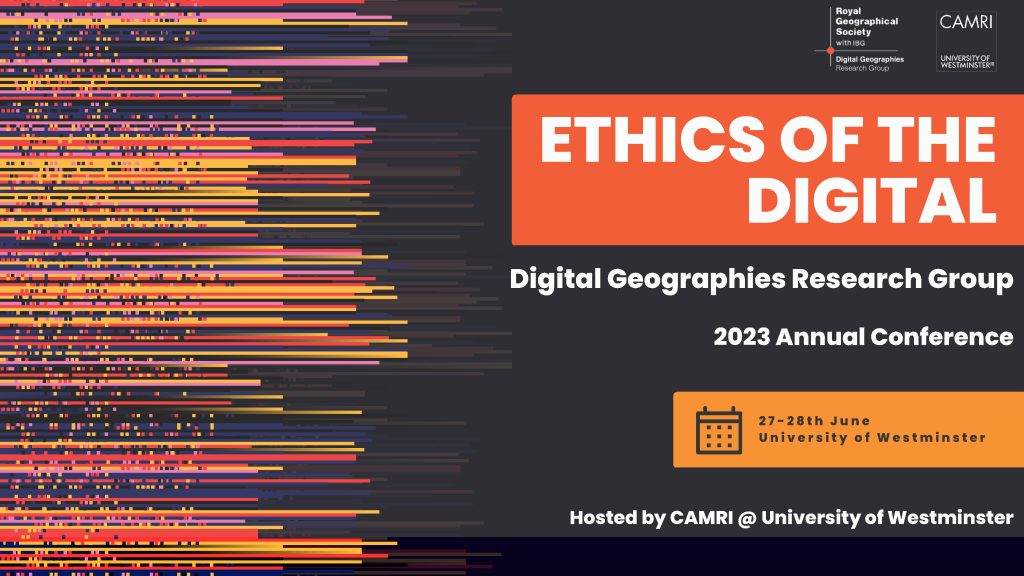Ethics of the Digital

This conference on Ethics of the Digital has been organised by the Digital Geography Research Group of the RGS, and is hosted by the Communication and Media Research Institute (CAMRI) at the University of Westminster on 27-28 June 2023.
The vast majority of the world now live within heavily mediated and data driven societies. Data is collected in vast quantities by a wide range of actors, and increasingly powerful tools are being used to extract information from this data to influence the way we are governed, the products we buy, and the socio-political choices we make. Concerns have long been raised by the ‘black box’ and opaque nature of the new digital spaces created through the collection, processing, and curation of data. The collection and distribution of data has been made increasingly possible due to improved global connectivity and cheaper storage, meaning this data now has the potential to significant alter the human condition, both in digital and physical spaces.
Open data has often being positioned as an antidote to ‘black box’ practices’, and while the democratisation of data access is applauded by many, open data also comes with ethical issues and the potential for misuse. Ethical issues involving data and the digital present a unique set of complex challenges compared to many other technologies. This is in no small part due to data and the digital realm being both complex beyond the understanding of the general public, while also being ubiquitous and having the potential to impact all aspects of life. This conference seeks to explore the challenges, opportunities and contentions between open and other forms of data within and beyond the digital landscape. The conference will examine the nature of digital data, its ethical issues, and also themes related to, the public sphere, data ownership, data collection and consent, personal data, how we find trust in data and the algorithms that process it, privacy and confidentiality in an open data society, and the individuals, companies, and governments tasked to used such data.
Programme
The Ethics of the Digital Conference features keynotes from researcher, BBC broadcaster, and author of Technology Is Not Neutral: A Short Guide to Technology Ethics, Stephanie Hare. The Open Data Institute will run workshops on Data Ethics and Assessing Risk when Sharing Data. The event will host the launch of ‘A Research Agenda for Digital Geographies’ edited by Tess Osborne and Phil Jones. We also have over 25 papers, roundtables, and interactive sessions.
Registration Fees
Please register for this event using the following link: https://store.westminster.ac.uk/product-catalogue/media-arts-and-design/digital-geographies-conference/digital-geographies-conference
| DGRG Member Registration (in-person) | £30 |
| Non-Member Registration (in-person) | £35 |
| Postgrad and precarious employment registration (in-person) | £12 * |
| University of Westminster Student registration (in-person) | £0 (student number will be required) * |
| Online only – note only some talks will be available online | £0 |
Registration includes full attendance to the full conference, breakfast on Tuesday and Wednesday, Lunch and drinks reception on Tuesday.
Travel Bursaries
Travel Bursaries are available to those who need support in travelling to London for this event. Bursaries of up to £50 to help cover transportation or hotel costs have been made available thanks to the kind support of the Royal Geographical Society. Applications for bursaries should be made by completing the travel bursary form and returning it to Jack Lowe.
* Reduced registration fees for postgraduate and precarious workers, as well as free registration for University of Westminster students has been made possible thanks to the kind support of the Communication and Media Research institute at the University of Westminster.

